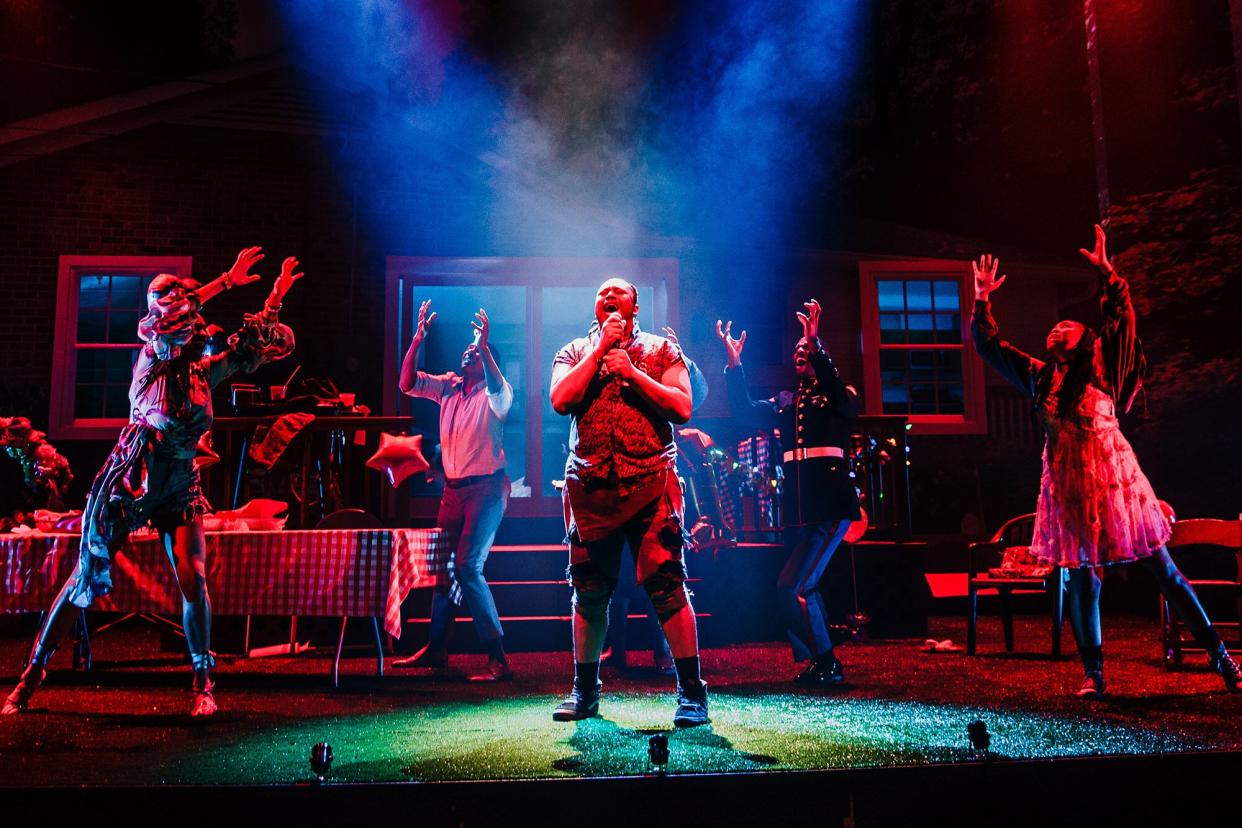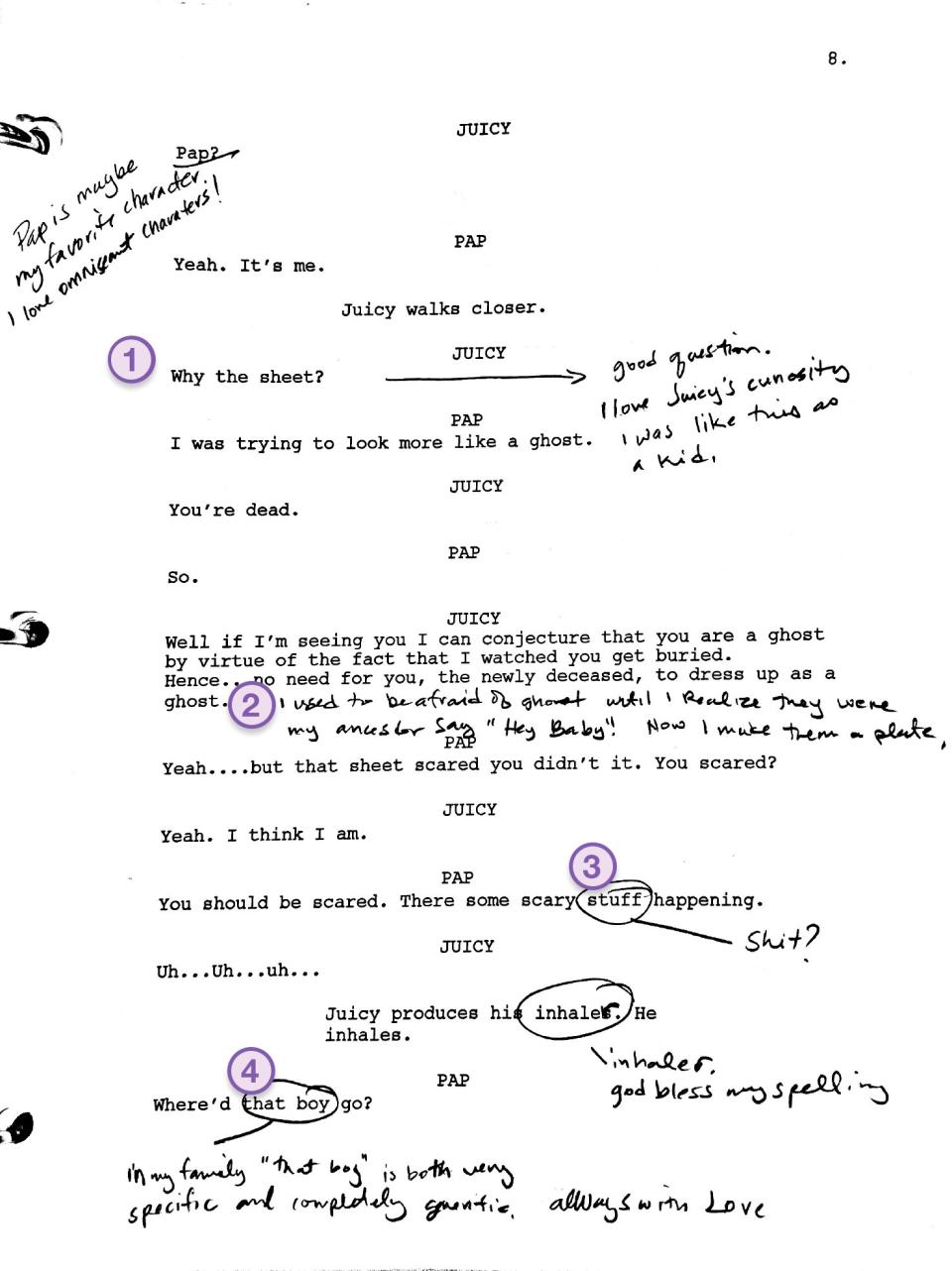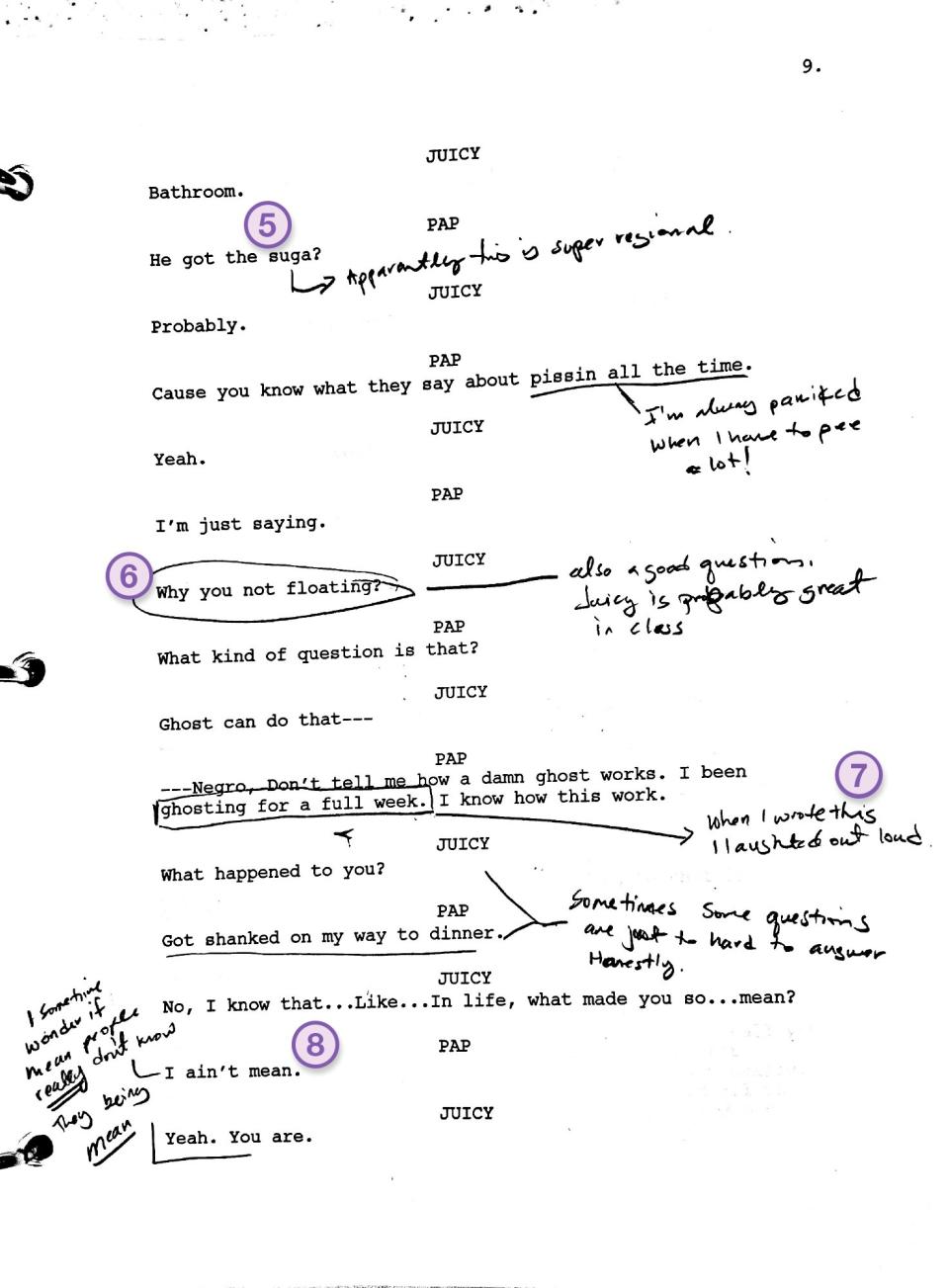Playwright James Ijames breaks down Fat Ham script, talks breaking the cycle of generational trauma

- Oops!Something went wrong.Please try again later.
To deconstruct Hamlet or not to deconstruct Hamlet?
For playwright James Ijames, there was only one choice, using the Shakespeare play to interrogate generational trauma and break harmful cycles by situating the circumstances of the melancholy Dane at a contemporary Southern family barbecue.
That choice paid off in Fat Ham, which won Ijames the 2022 Pulitzer Prize for drama, and will open on Broadway on April 12. The Broadway production is the third iteration of Fat Ham after its debut as a filmed production at the Wilma Theater in 2021 and a run at the Public Theater in May 2022.
The play follows Juicy (Marcel Spears), a young queer Black man, who is confronted by the ghost of his father during a barbecue. When Pap (Billy Eugene Jones) demands that Juicy avenge his murder, Juicy is thrown into crisis as a sensitive and self-aware man, who recognizes the parallels to Hamlet's plight and seeks to avoid the tragedy of that play.
Ijames first fell in love with Hamlet as an undergraduate, acting in an extremely shortened student production of the play. "It stayed with me," he tells EW. "Then maybe about seven or eight years ago, I was like, 'I wanna do something with a Shakespeare play,' but I wasn't sure which one, and I picked it up and started reading it. I was like, 'I think I can pull from my family experience, the kinds of people in my family and my community from my childhood.' It started off as an experiment, playing with what some of these scenes from Hamlet would feel and look like in the language and in the manner of people from the South. I was shocked at how well it worked."
There might be those who question why Ijames would want to draw from the most widely read writer of the Western canon. But Ijames believes Shakespeare was doing something that allows his works to transcend time and space. "Hamlet is an adaptation of an older story," he reflects. "Shakespeare is writing out of the larger human story archive. He's writing stories that people recognize and that people can identify with. That's one of the main reasons his plays have been kept intact better than a lot of other writers. He dropped into something about dramatic language and what actors need to be great on stage and what inspires a production. A lot of writers look to Shakespeare as a model of structure, a model of how poetry works in a play. Those are the things that keep him at the forefront."

Marc J. Franklin A family barbecue goes haywire with revenge on the menu.
In advance of the show's opening night, Ijames has exclusively shared two pages of the Fat Ham script, annotated with his notes.
The pages center on Juicy's first encounter with the ghost of his father, Pap, and his father's inducement to seek revenge for his murder. It's the moment that puts the events of the rest of the play in motion.
"In the beginning of the play, Juicy is very stuck," says Ijames. "He's directionless. He hates that his mom just married his uncle. Then, Pap shows up and is like, 'Things are not the way you think they seem.' Everything from that point forward draws a line back to the decision he has to make about what he's going to do about that. He wants to run and hide and forget that it happened. But there's enough that provokes him and pushes him forward through the play that makes him keep trying to negotiate what he's going to do. That's what it's like when you're dealing with generational trauma. You're constantly negotiating. Do I sever myself from that thing that feels comfortable, feels normal, but is deeply unhealthy or try to transform it? The visitation of his father is a wake up call — 'You're running from this thing, and you have to deal with it or it's always going to be there with you. It's always going to be under the skin.' He has to make some decisions for himself and he does."
Here, Ijames breaks down this crucial scene and his notes on the dialogue and staging.

Fat Ham on Broadway
1. Holy sheet
We're all familiar with the Halloween version of a ghost — a human covered in a white sheet with round holes for eyes. Ijames found humor in riffing on that as opposed to the more traditional depictions of the ghost of Hamlet's father.
"There was a day I was doing a reading of it at a writer's group, and at that point, that draft of the play, he just sauntered out and I was like, 'Ah, I want to do something else,'" the playwright explains. "When the actor read it, it was like, 'There needs to be a punch here. There needs to be something that's a little more theatrical.' I wanted something that was gonna make this moment strange because people expect the ghost to show up, but they don't expect the ghost to show up and try to dress like this."
"I thought a sheet would be very funny," he continues. "I'd just watched a terrible movie version of Scooby-Doo, and that's what the ghosts look like in Scooby-Doo. It's always like somebody with a sheet over their head. It turned out to be one of the funnier moments in the play."
2. A good haunting
In his notes, Ijames explains how he used to live in perpetual fear of ghosts, but that now he welcomes their presence as a visit from loved ones. This fed into his representation of hauntings in the play.
"I don't like horror movies," he says, with a laugh. "I don't like haunted houses. I've always had an anxiety about ghosts and things like that. But then, 2020 and 2021 was a moment of great loss in my family, and I was struggling with how to deal with that. I kept having this feeling of people who I had lost being present. People say that ghosts don't haunt places, they haunt people. It's less of a haunting and more of like, 'Oh, there's this person that's looking out for.' You can see where you're messing up or when you need a little support or something. It's changed them to that for me. In this play, there's this whole scene with Juicy and his father that's kind of antagonistic, but then it ends in this way where one is giving the other one a little bit of what they need in that moment."
3. Good s---?
In this note to himself, Ijames ponders turning the word "stuff" to "s---." Did he?
"I didn't," he admits, when we talk in March. "It's not too late. I may still do it. I need to see it in a run one more time. I swear so much in the play and I'm not a person that swears a ton in my life. But in this world, with these characters, it just rolls off their tongue. I was trying to pull it back in some places, but now I'm like, 'Ah, the flow of s--- versus stuff is just better.' So, the jury's still out."
4. That boy who must not be named
In Ijames family, "that boy" has specific connotations. He explains: "It's sort of like 'aloha,' it means a lot of different things. If somebody's like, 'Is that boy coming over here today?' it's usually someone that's forgotten the name of said boy — but you have had enough communication with this person you're talking to that you know what boy they're talking about. Another meaning is if someone in my family doesn't want to say the name of the person 'cause they're frustrated with them, they'll say 'that boy,' and you know who it is because you know who they don't like. It's an avoidance language almost. Back in the day, people were afraid of bears. So the word bear translates to like 'furry, big thing.' It's not actually the name of the thing. 'Cause they were afraid to call it the name of the thing because they felt like they would bring it toward them if they said the name of it. 'That boy' felt a little bit like avoidance language to me in this really specific way in my family."

Fat Ham on Broadway
5. Suga, suga
When Ijames first wrote this line, he worried it would be too regional and go over the heads of many audience members. "It's basically a colloquialism for Type 2 diabetes because you avoid sugar," he says. "So people call it, 'Well you got the suga.' Putting 'the' at the beginning of things that are not singular, that's also a very regional southern thing. I grew up with people when they'd say, 'Oh, you know, she's down with the suga, that's why she wasn't in church on Sunday.' It's just a funny, little colloquial way of describing something. And I had this real anxiety of how do we explain that? Do we need to put dramaturgy in? But, no, people understood what it was. So it's maybe not as regional as I thought."
6. Ghosted
When Juicy asks Pap, "Why are you not floating?" it brings the physics of haunting to the forefront of their conversation, while also creating a moment of humor. "I wanted to deal with the elephant in the room," Ijames says of this exchange. "Which is, yes, he doesn't ghost the way ghosts normally work, but he's gotta tell it. But he knows how ghosts work. So it was a way of like, 'Yes, he's not floating. We get it. It's fine.' This production has quite a bit of illusion work in it — the stuff that they're doing is like magic and things are flying around, but he's just walking around like everybody else. That was a way answer to that immediately — this is a ghost who follows his own rules. That's very in line with the character, even in life. 'This is how I do things and this is how I want the world to work.' So that is carried over into his ghost life as well."
7. LOL
Ijames admits that, as he notes here, he does often laugh out loud while writing comedic moments. "I'll write something and then sometimes I'll laugh out loud at it and then in front of an audience, it's like crickets," he says. "So I'm like, it was funny to me, but it was obviously not funny to everybody But your first audience is you. So if you can make yourself laugh, you're probably going to hit a few people in the audience at the end of the day."
8. Why you gotta be so mean?
With this exchange, Ijames ponders whether or not mean people don't know they are being mean. Has working on three productions of Fat Ham given him a firm answer on either side? "Lol," he answers. "Honestly, I still don't know."
Fat Ham is now playing at the American Airlines Theater in a limited run through Aug. 6.
Related content:

